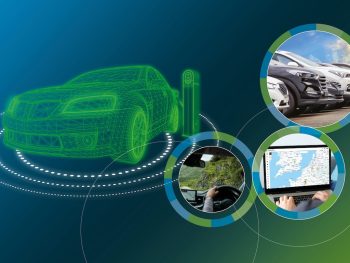Dependable data: Developments for fleet telematics
The advantages of unlocking mobility data for the UK’s digital and green transition, by Chris Horbowyj, UK commercial director, Targa Telematics.

Chris Horbowyj, UK commercial director, Targa Telematics
The value of data will be a key enabler in the coming years, as smart and connected mobility becomes an integral part of our daily lives and work. In today’s highly interconnected world, the vast amounts of data generated by the movement of people and vehicles offer immense potential.
Mobility data has become a powerful driver of innovation and efficiency, enabling solutions that foster more sustainable and intelligent urban environments. By harnessing data, service providers can develop smarter transport systems, optimise traffic flows, strengthen logistics networks and enhance road safety. Mobility data is not just about the movement of vehicles – it is reshaping how we live, work and travel – paving the way for a more efficient and sustainable future. In short, data is what moves us forward.
The challenge of fragmented mobility data
OEMs are increasingly leveraging vehicle-generated data to enhance performance, improve user experiences and enable new services. However, the success of these efforts hinges on overcoming one of the sector’s most pressing challenges: the lack of standardisation in how vehicle data is collected, processed and shared. Many car manufacturers develop proprietary data formats, systems and platforms that are not compatible with one another, making it difficult for fleet managers to gain a clear view of their multi-brand fleets. However, data availability alone is not enough; it must be transformed into actionable insights. To achieve this goal, it is essential to compare large volumes of data, leveraging AI and machine learning technologies. Moreover, to fully harness the potential of this data, fleet or operations managers need to partner with experts who have the industry know-how and competencies to help them identify the right indicators and use cases to optimise their operations.
With over 20 years of experience, Targa Telematics has been at the forefront of this transformation from the very beginning. Today, the automotive industry remains highly fragmented, making it challenging for customers and third-party services to integrate and operate across different brands and vehicle models, limiting interoperability. Data from connected cars, telematics and mobility services remains siloed, preventing software developers, fleet operators and other service providers from using it effectively.
Bridging the data gap: the role of telematics providers
Telematics companies are uniquely positioned to bridge the gap between auto makers and end-users in this evolving data ecosystem. As key integrators, enablers and facilitators, they collect, analyse and process vast amounts of vehicle-generated data to deliver actionable insights that drive everything from fleet optimisation and predictive maintenance to insurance modelling.

Telematics firms transform OEM data streams into consistent, usable information
By integrating fragmented data sources, standardising diverse datasets and ensuring interoperability across platforms, they transform OEM data streams into consistent, usable information. This enables fleet operators, insurance companies and mobility providers to harness data more effectively.
At the same time, telematics companies ensure compliance with data privacy regulations, safeguarding user information while supporting the development of innovative mobility services and applications that contribute to safer, cleaner, and smarter urban mobility.
Telematics companies are set to play a pivotal role in creating a more integrated, efficient and sustainable mobility landscape through smarter and data-driven solutions. However, to unlock the full potential of connected vehicles and advanced telematics, greater industry-wide collaboration and a shared commitment to ensuring mobility data is accessible, secure and fully utilised are essential.
While companies such as Targa Telematics are actively contributing to this progress, participation from all stakeholders is crucial to accelerating change. Auto makers, mobility operators, telematics providers and technology innovators must now work together to develop a unified and open mobility data ecosystem. By joining forces, we can drive the transformation needed to power the next generation of intelligent mobility and shape a safer, smarter and more sustainable transport landscape for all.
Telematics case studies
Targa Telematics leverages its advanced IoT and digital solutions to improve customers’ fleet operations, enhancing efficiency and security across fleet management, leasing and rental markets. Data is essential for creating valuable services. Specific data enables the development of solutions that respond to different customer needs across multiple market segments, supporting unique use cases. The company accesses key vehicle data – including mileage, fuel consumption, GPS location, EV metrics and diagnostics – either through aftermarket devices or from OEM data streams, in this case without the need for additional hardware.
Targa Telematics has signed agreements with major global auto makers, starting with Stellantis in 2017 and recently expanding to partnerships with Volkswagen Group and Toyota. One of the key abilities of the company is to combine multiple sources of data to create advanced mobility solutions seamlessly thanks to its deep industry expertise. Leasing companies in the UK such as Grosvenor Leasing, Pendragon and TCH Leasing can reduce downtime, enhance maintenance operations, minimise fraud risks and VOR situations by leveraging on their fleet data. At the same time, access to the right data and the know-how of a market leader provides the flexibility to offer their own customers a range of connected services to streamline fleet operations and make their corporate mobility more sustainable.
Targa Telematics’ partnerships with car manufacturers aim at enhancing existing mobility services and developing new ones by integrating vehicle data directly from OEM electronic systems. This approach reduces the operational impact typically associated with aftermarket installations. The goal is to overcome the complexity of integrating and standardising data flows, making them accessible through Targa Telematics’ digital platforms based on customer needs and cost-efficiency. The company delivers reliable, high-performance results through rapid solution deployment, supported by weekly feature updates.














Leave a comment